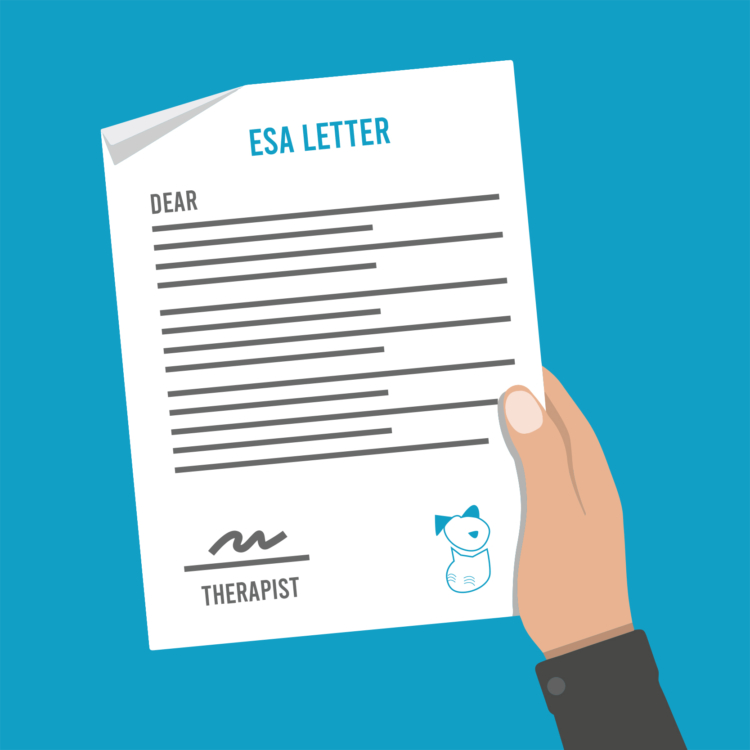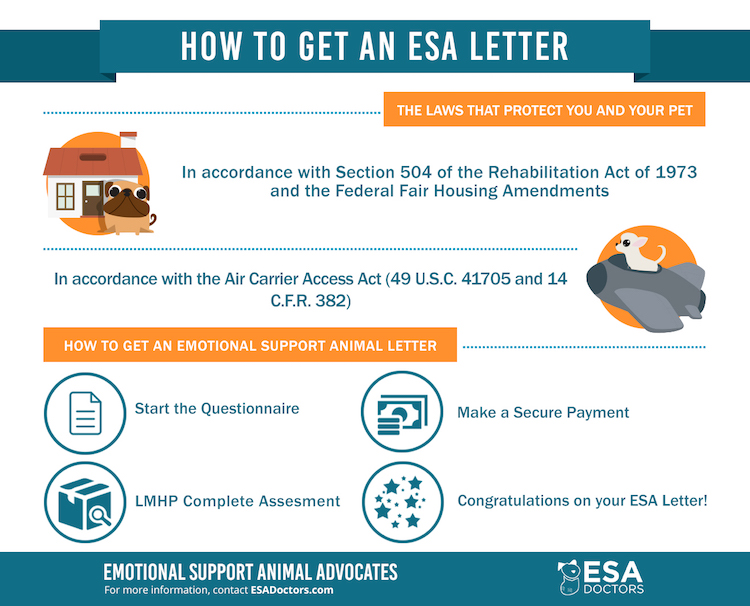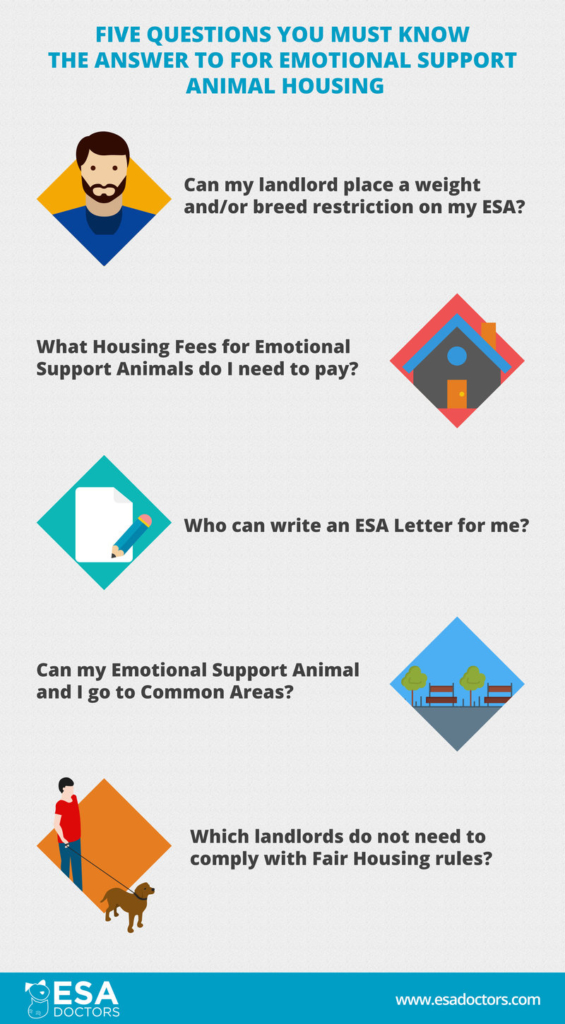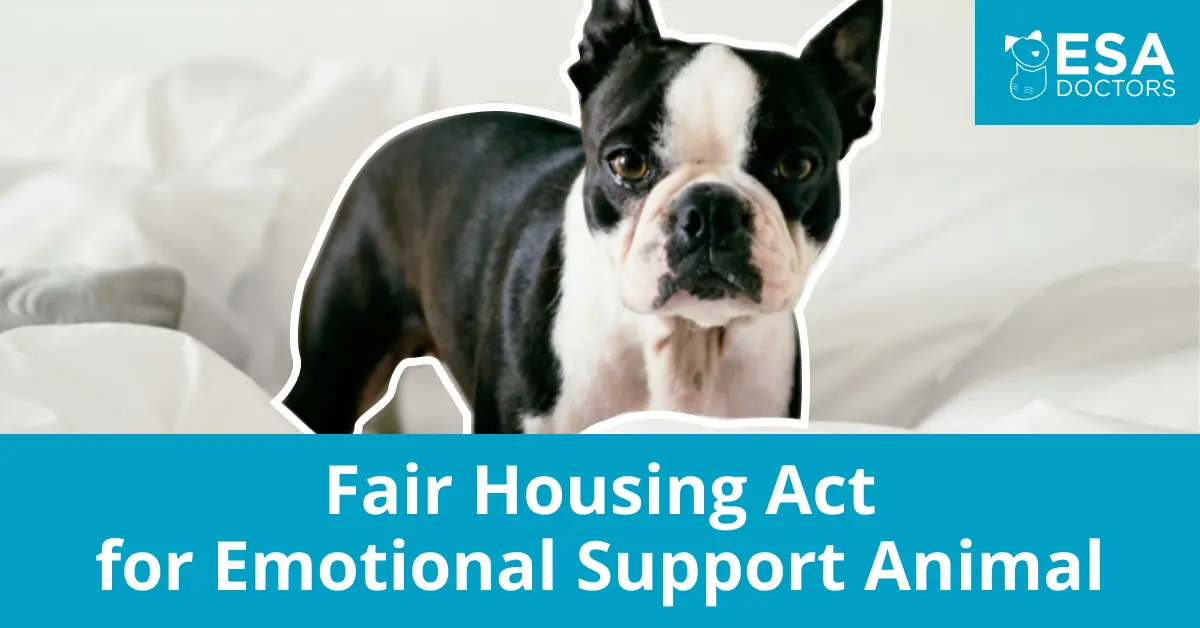Since 2015, ESA Doctors has helped clients interested in qualifying for emotional support animals connect with real licensed mental health professionals. As Emotional Support Animal (ESA) advocates, we find it important to educate our clients and anyone in need about ESA housing rights and how to effectively communicate with your landlord.
We know first-hand that dealing with landlords can be intimidating and sometimes frustrating, especially if the landlord is unaware of ESA rules or is opposed to emotional support animals in general. That is why we believe it is important for all ESA owners to be well-versed about the rules that pertain to their ESAs under the Fair Housing Act.
Your Emotional Support Animal’s Housing Rights
If you are knowledgeable regarding ESA housing rights, you are more likely to be successful in requesting accommodations for your ESA from your landlord. We also believe that ESA owners should act responsibly and be good ambassadors for other ESA owners, and that means knowing what rights their ESAs have and do not have.
- Can my landlord place a weight and/or breed restriction on my ESA?
- Do I have to pay Pet Fees or a Pet Deposit for my Emotional Support Animal?
- Who can write an ESA Letter for me?
- Can my Emotional Support Animal and I go to Common Areas?
- Which landlords do not need to comply with Fair Housing rules?
If you are ready to see if you qualify for an ESA letter and request reasonable accommodation for your Emotional Support Animal, we would be happy to assist you.
5 Questions You Must Know the Answer to for Emotional Support Animal Housing
No, landlords, co-ops and HOAs are not permitted to exclude your emotional support animal solely because it is a certain breed or weight. The Department of Housing has clearly stated that categorical breed restrictions are prohibited. For example, a landlord can’t deny an ESA solely on the basis that it is a Pitbull, even if the building has a policy prohibiting Pitbulls as pets.
Instead, landlords may only determine if the specific ESA in question poses a direct threat to the health and safety of others. That determination has to be based on an individualized assessment of the ESA’s actual conduct, and cannot be based on stereotypes about the specific breed. That means a landlord can deny your Pitbull if there is actual evidence that is a threat to others, but not if the landlord is just basing their decision on anecdotal evidence about Pitbulls.
Landlords are not allowed to charge pet fees and pet deposits in connection with ESAs. As previously noted, conditions and restrictions that landlords apply to normal pets may not be applied to ESAs. That means that while landlords can require applicants or residents to pay a deposit or fee in connection with a normal pet, they are not allowed to require applicants and residents to pay a deposit or fee for an ESA.
Landlords are also not permitted to charge an application fee in order to consider the tenant’s request for accommodation of their ESA.
It is important to note however that your landlord can charge you if your ESA causes damage to the property. Your landlord may be able to deduct expenses for damages caused by your ESA from the general security deposit you paid for your renting your home. For an in-depth assessment of the updated Fair Housing regulations around Emotional Support Animals, you may find this article helpful. 
The Fair Housing Act allows an ESA letter to come from a licensed healthcare professional, which includes licensed professionals such as nurses, psychologists, therapists, counselors, social workers and psychiatrists. Many landlords mistakenly believe that an ESA letter must be “prescribed” from a medical doctor. An ESA letter is a recommendation letter that comes from a licensed healthcare professional, it is not a prescription that must come from a physician. Doctors have the ability to write ESA letters but they are sometimes uninformed about ESAs and not in the best position to recommend an ESA to a patient.
The best place to go to see if you qualify for an ESA letter is your existing therapist. If you do not have access to a therapist or are having difficulty finding one, you can connect remotely with someone to assist you. ESA Doctors can help connect you to a mental health professional that is licensed for your state.
Yes, an emotional support animal must be allowed in common areas where other tenants are allowed, such as courtyards, gardens or pool areas. The rules regarding ESAs were designed to allow tenants with disabilities to enjoy the premises of their homes to the same degree as non-disabled tenants. The Department of Housing has stated that an ESA is allowed “in all areas of the premise where persons are normally allowed to go, unless doing so would impose an undue financial and administrative burden or would fundamentally alter the nature of the housing provider’s services.”
Although most housing is covered by the Fair Housing Act, there are some exceptions. The Fair Housing Act exempts (1) owner-occupied buildings with no more than four units, (2) single-family houses sold or rented by the owner without the use of an agent, (3) housing operated by religious organizations and (4) private clubs that limit occupancy to members. If your housing falls into one of those categories your landlord does not have to accommodate ESAs.
For example, if you live in a 3 unit housing complex and the owner of the building lives in one of the units, they are likely exempt from Fair Housing requirements for ESAs. However, many landlords who are not obligated to accommodate ESAs because they fall under one of these exemptions will often allow ESAs anyway as a courtesy. It is always best to speak openly to your landlord about your need for an ESA.
How can I qualify for an ESA letter?
To qualify for an ESA letter, you must work with a licensed medical professional. If you do not currently have a therapist or you are having trouble finding one or seeing one in person, ESA Doctors can help connect you to a licensed professional that works remotely. The compassionate professionals that ESA Doctors work with are familiar with ESAs and can help determine whether an ESA is right for you. Just click on the “Get Started” link below to get started.

If you believe you benefit or would benefit from an Emotional Support Animal’s presence and support. We can help connect you with a licensed mental health professional directly to see if you may qualify.








I have a 10 week old puppy , I am currently making him a ESA . Can my landlord deny him ?
There is no age minimum for emotional support animals. Your landlord will have the right however to demand a valid ESA letter.
my landlord has all the paperwork before we moved in that i have a ESA cat and she still charged me a non-refundable pet deposit, we have given her all the laws and given our notice to move and she is refusing to refund the pet deposit. what can i do?
Your landlord was not entitled to collect a pet deposit in relation to an ESA. You may want to inform your landlord that if they continue to violate Fair Housing guidelines that you may file a complaint with HUD.
I want to add my boyfriend to my lease, he as well as I have 1 ESA, both dogs. Can my landlord refuse to add him onto my lease because of my dog ?
In order to have rights as an ESA owner, he will need his own ESA letter from a licensed healthcare professional that states his need for his own emotional support animal. Landlords cannot discriminate against potential tenants on the basis of their need for an assistance animal.
I live in an apartment with my mom and grandma. Each one of them has 1 cat, making 2 in our residence. 2 pets are the max for our apartments. I have chronic anxiety and depression. I do not have a pet of my own. I’m trying to adopt a cat to certify as my ESA. But my manager says no cause we are at our max and an ESA will not cover a third, so I was denied adoption. Can they deny me an ESA? I have an appt this week with my Dr to discuss getting a letter.
ESAs are technically not pets under HUD rules so they should not count towards a pet limit. You also do not need to “certify” an ESA. The only way to qualify for an ESA is by getting an ESA letter from a licensed healthcare professional. Please see this link for more info: https://esadoctors.com/ask-doctor-emotional-support-animal-letter/
My landlord canceled my abylity to renew my lease because last month mi yearly lease expires she denied my month to month after I showed her my doctor recomendation for my ESA because of no pet policy in my complex I don’t want to move because there is nice patch of green where I can walk my dog and not worry about cars hitting us we live in Davie Fl. What should I do?
If you submitted proper ESA documentation, a landlord can only deny an emotional support animal if they have a valid excuse, such as if the animal poses a safety or health hazard. ESAs are exempt from no-pet policies – that is not a valid reason to reject an ESA.
My landlord has now requested MORE photos of my ESA, after receiving a carefully written email from me citing the need to being him home, unjustifiable continued kennel expenses & continued non-responsiveness to my previous email & texts. I was kept waiting over a month for their agent to reply with a definitive answer to my repeated requests regarding my Reasonable Accomodation by myself & my Doctor. I sent the Doctors letter, Government links regarding ESA’s as well as photo, promptly when they requested them but was largely being ignored since until I sent that email on Friday. Now, she is demanding 2 more photos of my dog. Should I send them? Is it legal for them to demand them? Since she already received one, isn’t it unreasonable to be asked to send front+side views WITHOUT a human in the photos? Time is of the essence as kennel costs are astronomical. I appreciate any insights you may have. Thanks so much!
Landlords have to respond to ESA requests promptly under HUD’s guidelines (within 10 days). If you have submitted a valid ESA letter from a licensed healthcare professional that should be the only documentation you need for reasonable accommodation of your ESA.
My dog has an esa letter from my Dr. And Psychiatrist, I live in a sober living house. The people that work there let me have her weekends before I got my letter. Now that I have my letter, they are trying to deny her, tell me if I have her I will have all kinds of rules such as having to sit in my room with her all the time. Can they restrict me from any parts of the house or tell me if I go to a recovery meeting across the street for an hour that I can’t leave her in my room? Or that I can’t leave her in my room alone ever?? I never leave for more than 2-3 hours and its not everyday. I would be there 90% of the week
An ESA does not have to be attended by its owner at all times. ESAs are commonly left alone while their owners work and run errands for example. We’re not sure however how Fair Housing rules apply to your particular living situation.
My landlord denied my sons ESA letter because it is missing a letterhead. Due to COVID, his therapist is working from home and does not have the paper with the letterhead printed on it. However I sent the letter that was provided to me by the therapist with the license number and all the necessary information. Is this discrimination or is the letterhead necessary. I have not fully moved in because my son needs his ESA.
It seems the landlord is overreaching here – the most important thing is that the therapist provide their contact and license number for verification purposes.
One of our neighbors ( a renter, not an owner) in our condo building has an ESA dog that is left alone all day while the owner is at work. The dog barks constantly while alone in the apartment. It can easily be heard in the units and common areas next to, above and below the dog. The condo building has a “no pet” policy. Other owners are over the constant barking. Do the other occupants have any right to expect quiet enjoyment of their homes or does the ESA trump those rights?
The right to have an ESA must certainly be weighed against the right of other tenants to also enjoy their homes. In these situations, it should be the condo association that acts on behalf of the complaining tenants and to mediate the situation. Owning an ESA does not mean that your ESA is exempt from being well-behaved.
I have a commercial building and have a tenant wanting to bring is dogs inside the building in common areas and his unit he rents. He had a LPC write a letter. What are the rules for a commercial building with 36 units
Emotional support animal rights are only for tenants in residential homes. They do not have rights in commercial properties that are not residential.
Can you have a ESa in a group home for special needs adults.. They will not allow my niece to have on in minnesota.. even though her doctor presribed one
We recommend you check with your group home to see what their policy is regarding assistance animals.
Do support dogs need to be leashed unless doing their job, like in common areas?
ESAs as well as any other animal should be under its owner’s control at all times when in common areas. If your landlord requires leashes generally for all animals in common areas then you may need to have your dog leashed as well. ESAs are not service dogs, they do not perform tasks or “jobs”, they provide support just through their presence.